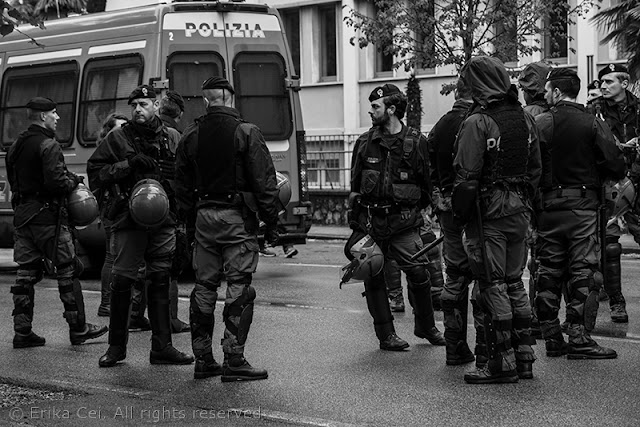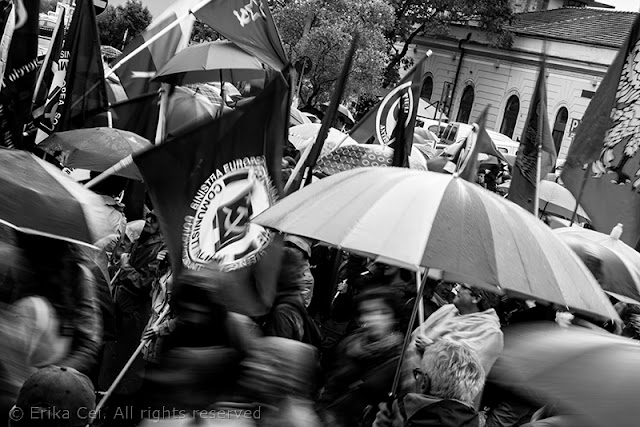 Fascist legacy is not merely a BBC documentary film about the unpunished Italian war crimes before and during World War II. It rather also indicates particular attitudes and behaviors characterizing some contemporary societies.
Fascist legacy is not merely a BBC documentary film about the unpunished Italian war crimes before and during World War II. It rather also indicates particular attitudes and behaviors characterizing some contemporary societies.I'm referring to those countries who celebrate their entrance into World War I, which had over 17 million deaths and 20 million wounded.
I'm referring to the members of right-wing extremist groups, marching like soldiers and carrying flags with symbols that closely recall those used by nazis and fascists in the Thirties and Forties.
I'm referring to all local authorities who allow creepy and perverse right-wing extremist demonstrations to take place in towns that were destroyed by World War I and by Fascism itself.
I'm referring to all national or local authorities who allow these kind of demonstrations to take place next to historical festivals, where scholars and journalists are discussing about some of the major events of 20th century.
I'm finally referring to all those who prefer to believe in an ideology, rather than to the facts, because it's easier, because they don't have to "waste their time" by reading books or by going out of the door to see what's going on, because an idea is more charming and more exciting than the mere facts.
And the facts are the these: on Saturday I took a train and went to Gorizia, my hometown. It was rainy there and at 10.00 A.M. only a few people where around on the main street, leading to and from the railway station.
While walking in the park "Rimembranza" I took a couple of pictures and right after I was stopped by a police officer who asked me to show my ID. The woman in uniform wanted also to know why I was in Gorizia, assuming I was there for the demonstration. "No, I'm here for the history festival", I answered briefly. Indeed, I was going to listen to a lecture about the Armenian genocide, as part of "éStoria", the renown festival of history which takes place in Gorizia every year.
At lunchtime I took a walk around the town up to the former border crossing "Casa Rossa" (Red house) on the Italian-Slovenian border. In the forecourt there was a circus tent. I asked the permission to take some pics but I was denied.
So I went back to the station, where a group of people from Gorizia, Nova Gorica and other nearby towns were gathering to demonstrate against the national meeting of "CasaPound" (an italian right-wing extremist organization), that was going to march through the town and celebrate the 100th anniversary of Italy's entrance in World War I, with the motto "Italy, Rise, fight and win!" as if it were a football championship.
"What fuck do you have to celebrate? Do you think a war has to be celebrated?", I would have liked to ask to those dark-dressed guys from all over Italy, singing the national anthem and carrying flags and banners that recall fascist and nazis mottos and symbols.
I would have liked to ask something similar to a soldier who was next to an armored truck, exhibited in front of the town theatre, but I preferred to remain silent, 'cause he was really polite and nice and I didn't want to be unpleasant with him.
Finally, I wouldn't have dislike to listen to another lecture within "éStoria" but I felt really tired and preferred to go back home.
These are the facts. Exciting? Touching? Moving? Not at all, but I prefer these ones to any kind of ideology, keeping in mind the words of Hannah Arendt ("The origins of totalitarianism").
And the facts are the these: on Saturday I took a train and went to Gorizia, my hometown. It was rainy there and at 10.00 A.M. only a few people where around on the main street, leading to and from the railway station.
While walking in the park "Rimembranza" I took a couple of pictures and right after I was stopped by a police officer who asked me to show my ID. The woman in uniform wanted also to know why I was in Gorizia, assuming I was there for the demonstration. "No, I'm here for the history festival", I answered briefly. Indeed, I was going to listen to a lecture about the Armenian genocide, as part of "éStoria", the renown festival of history which takes place in Gorizia every year.
At lunchtime I took a walk around the town up to the former border crossing "Casa Rossa" (Red house) on the Italian-Slovenian border. In the forecourt there was a circus tent. I asked the permission to take some pics but I was denied.
So I went back to the station, where a group of people from Gorizia, Nova Gorica and other nearby towns were gathering to demonstrate against the national meeting of "CasaPound" (an italian right-wing extremist organization), that was going to march through the town and celebrate the 100th anniversary of Italy's entrance in World War I, with the motto "Italy, Rise, fight and win!" as if it were a football championship.
"What fuck do you have to celebrate? Do you think a war has to be celebrated?", I would have liked to ask to those dark-dressed guys from all over Italy, singing the national anthem and carrying flags and banners that recall fascist and nazis mottos and symbols.
I would have liked to ask something similar to a soldier who was next to an armored truck, exhibited in front of the town theatre, but I preferred to remain silent, 'cause he was really polite and nice and I didn't want to be unpleasant with him.
Finally, I wouldn't have dislike to listen to another lecture within "éStoria" but I felt really tired and preferred to go back home.
These are the facts. Exciting? Touching? Moving? Not at all, but I prefer these ones to any kind of ideology, keeping in mind the words of Hannah Arendt ("The origins of totalitarianism").
"An ideology is quite literally what its name indicates: it is the logic of an idea. Its subject matter is history, to which the "idea" is applied; the result of this application is not a body of statements about something that is, but the unfolding of a process which is in constant change. The ideology treats the course of events as though it followed the same "law" as the logical exposition of its "idea." Ideologies pretend to know the mysteries of the whole historical process - the secrets of the past, the intricacies of the present, the uncertainties of the future - because of the logic inherent in their respective ideas."
And later on: "The ideal subject of totalitarian rule is not the convinced Nazi or the convinced Communist, but people for whom the distinction between fact and fiction {i.e., the reality of experience) and the distinction between true and false {i.e., the standards of thought) no longer exist."
Against any ideology, against any fiction, I declare the mere facts today's winners.
That's all
Click here if you want to know something more about the section "And the winner is"

















Nessun commento:
Posta un commento